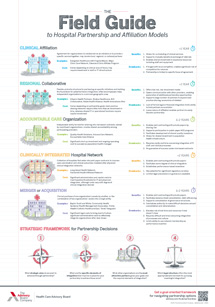Auto logout in seconds.
Continue LogoutHospitals often argue that consolidation will lower prices, but an analysis from the Nicholas C. Petris Center at the University of California, Berkeley, found that consolidation actually leads to higher prices, Reed Abelson reports for the New York Times.
Why the hospital market is consolidating
Many hospitals feel they have no choice but to either consolidate or close down, Abelson writes. According to Torrey McClary, a lawyer who specializes in mergers at King & Spalding, mergers "can fix a hospital and benefit the community."
For example, before Yale New Haven Health acquired the Hospital of Saint Raphael six years ago, half of Saint Raphael's beds were often empty, Abelson reports. After the acquisition, Yale New Haven spent more than $200 million modernizing "everything behind [its] walls," according to Yale New Haven president Richard D'Aquila, and now, Saint Raphael is now seeing record numbers of patients, D'Aquila said.
"Our focus is not on getting bigger," Mr. D'Aquila added.
Hospital systems say that, in addition to offering financial benefits, consolidation can improve care for smaller communities, Abelson reports. Elliot Joseph, CEO of Hartford HealthCare, a large hospital system in Connecticut, said, "We're actively trying to move care toward places that are accessible." He added, "The math for us is how we move the care out of the hospitals while maintaining our financial stability."
What happens to prices after consolidation
But despite the benefits of consolidation, it tends to lead to higher prices, according to the Petris analysis, which was conducted for the New York Times.
The Petris analysis looked at the 25 metropolitan areas with the highest rates of consolidation between 2010 and 2013 and found that, in most areas, the average price of a hospital stay increased between 11% and 54% in the years following a consolidation.
In fact, one-third of the metropolitan areas studied saw price increases for hospital stays of at least 25% from 2012 to 2014, from about $12,000 to $15,000, Abelson writes. These prices rose even more when large hospital systems acquired doctors' groups, according to Richard Scheffler, the director of the Petris Center. "It's much more powerful when they already have a very large market share," he said. "The impact is just enormous."
The New Haven area saw both the biggest decline in competition during the study period and the biggest increases in prices, according to the Petris Center. As Yale New Haven expanded, hospital admission prices jumped 25% between 2012 and 2014, compared to just 7% elsewhere in the state.
Jill Zorn, a senior policy officer for the Universal Health Care Foundation of Connecticut, said, "These systems are empire-building, there's no question. But to whose benefit?"
According to Zack Cooper, a health economist at Yale University, "there is near unanimity" among the academic community that hospital consolidation is driving up health care costs.
The analysis did find one area where hospital prices dropped: Albany, Georgia, where the Federal Trade Commission (FTC) unsuccessfully attempted to block HCA from selling its hospital to the only local competitor in 2011. However, while prices did decline, another study from two former FTC employees found that some hospital quality measures had declined in the area. The authors said the merger "highlights the problems that can occur when competition is reduced."
The hospital group that bought the hospital, Phoebe Putney Health System, pushed back on the findings. "Phoebe has made great strides in enhancing the quality of health care available to the people of southwest Georgia," Dawn Benson, Phoebe's general counsel, said in a statement.
In California, Xavier Becerra, the state's attorney general, has brought a lawsuit against Sutter Health, saying its acquisitions have led to significantly higher health care prices in Northern California. "You have to watch for these systems throwing their weight around," Becerra said. "We are looking for cases where consolidation does nothing for efficiency and leads to distortions of the market."
Sutter, for its part, has strongly disputed the claims in the lawsuit, saying in a statement earlier this year that "healthy competition and choice exists across Northern California" and saying that "Sutter Health is proud to save patients, government payers and health plans hundreds of millions of dollars each year by providing more efficient and integrated care"
(Abelson, New York Times, 11/14; Kaiser Health News/USA Today; 3/30).
New report: Learn 4 key principles for cost-focused integration
The pace of hospital merger and acquisition (M&A) activity is increasing in both deal count and total value. However, cost reduction is rarely the primary strategic objective of these deals. As a result, operational integration and cost reduction post-merger is falling well short of potential.
Most mergers are missing the valuable cost opportunity, but you don't have to. Read our report to learn more.
Don't miss out on the latest Advisory Board insights
Create your free account to access 1 resource, including the latest research and webinars.
Want access without creating an account?
You have 1 free members-only resource remaining this month.
1 free members-only resources remaining
1 free members-only resources remaining
You've reached your limit of free insights
Become a member to access all of Advisory Board's resources, events, and experts
Never miss out on the latest innovative health care content tailored to you.
Benefits include:
You've reached your limit of free insights
Become a member to access all of Advisory Board's resources, events, and experts
Never miss out on the latest innovative health care content tailored to you.
Benefits include:
This content is available through your Curated Research partnership with Advisory Board. Click on ‘view this resource’ to read the full piece
Email ask@advisory.com to learn more
Click on ‘Become a Member’ to learn about the benefits of a Full-Access partnership with Advisory Board
Never miss out on the latest innovative health care content tailored to you.
Benefits Include:
This is for members only. Learn more.
Click on ‘Become a Member’ to learn about the benefits of a Full-Access partnership with Advisory Board
Never miss out on the latest innovative health care content tailored to you.


